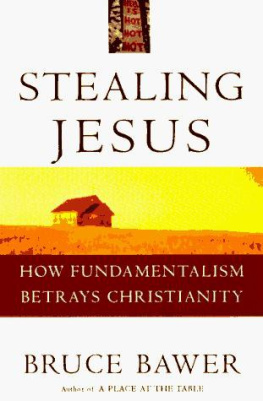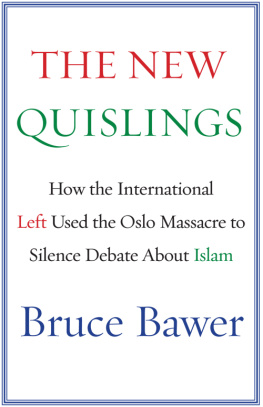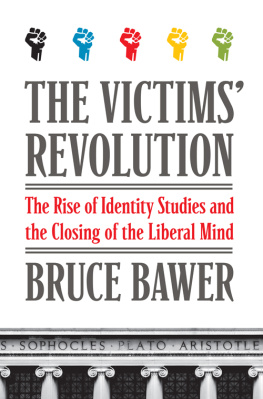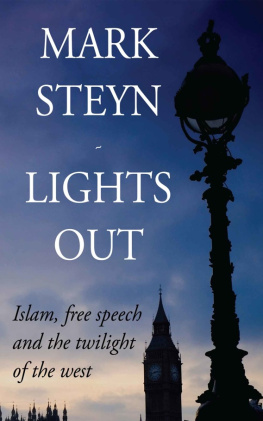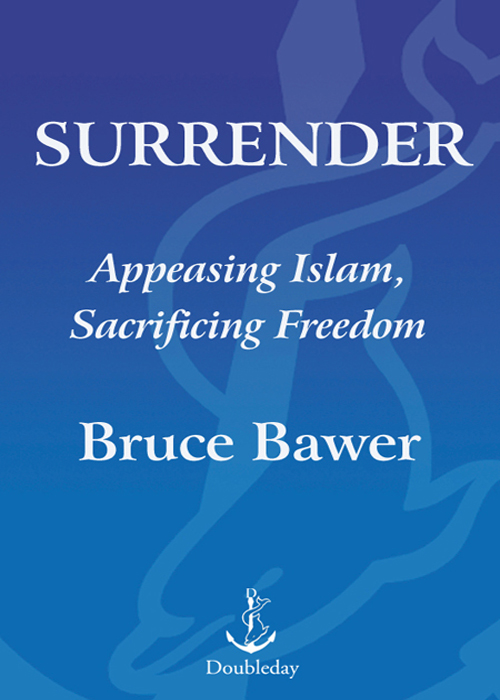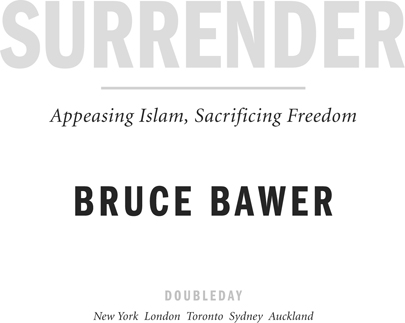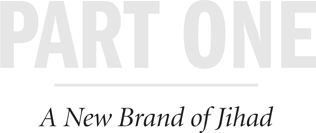Also by Bruce Bawer
While Europe Slept
Stealing Jesus
Beyond Queer (editor)
House and Home (with Steve Gunderson and Rob Morris)
Prophets and Professors
A Place at the Table
The Aspect of Eternity
Coast to Coast
The Screenplays the Thing
Diminishing Fictions
Innocence
The Contemporary Stylist
The Middle Generation
For Tor Andr
Those who can give up essential liberty to obtain a little temporary safety, deserve neither liberty nor safety.
Benjamin Franklin, notes for
a proposition in the Pennsylvania
Assembly, 1755
A man who has nothing which he is willing to fight for, nothing which he cares more about than he does about his personal safety, is a miserable creature who has no chance of being free, unless made and kept so by the exertions of better men than himself.
John Stuart Mill, The Contest
in America, 1862
In a democracy, no mans dignity is inviolate, and anyones pretensions may be mocked.
Adam Bellow, In Praise of
Nepotism
America did not teach men the idea of freedom; she taught men how to practice it.
Nicolas Sarkozy, in a speech
to the U.S. Congress, November
2007
Congress shall make no law respecting an establishment of religion, or prohibiting the free exercise thereof; or abridging the freedom of speech, or of the press; or the right of the people peaceably to assemble, and to petition the Government for a redress of grievances.
First Amendment, United
States Constitution
Fight those who do not believe in Allah, nor in the latter day, nor do they prohibit what Allah and His Apostle have prohibited, nor follow the religion of truth, out of those who have been given the Book, until they pay the tax in acknowledgment of superiority and they are in a state of subjection.
The Koran, Sura 9.29
We fell morally ill because we became used to saying something different from what we thought.
Vclav Havel, recalling life
under Communism in his first
New Years address as president
of Czechoslovakia, 1990
Stop self-censoring.
Ayaan Hirsi Ali to National
Press Club, 2007
CONTENTS
PART ONE: |
| I |
| II |
| III |
| IV |
| V |
| VI |
| VII |
| VIII |
PART TWO: |
| I |
| II |
| III |
| IV |
| V |
| VI |
| VII |
| VIII |
| IX |
| X |
| XI |
| XII |
| XIII |
| XIV |
PART THREE: |
| I |
| II |
| III |
| IV |
| V |
| VI |
ACKNOWLEDGMENTS
I am deeply indebted to John Talbot and Adam Bellow for their heartening commitment to this project; to Kristine Puopolo for taking it on in midstream and bringing to it such expertise and professionalism; to Stephanie Bowen and Katie Henderson for steering it expertly through production; and to Dan Feder and Amelia Zalcman for helping in a multitude of important ways.
Of the many online journalists and commentators who drew my attention to events I would otherwise never have known about, I especially wish to mention Charles Johnson, Hans Rustad, and B. Daniel Blatt. I also appreciate the support of several editors for whom Ive written about topics covered herein: Paula Deitz and Ron Koury at the Hudson Review; Brian Anderson and Ben Plotinsky at City Journal; Roger L. Simon, Aaron Hanscom, and Jos M. Guardia at Pajamas Media; Dan Savage and Christopher Frizzelle at The Stranger; Marcia Drezon at The New York Sun; Clara Germani at The Christian Science Monitor; Hege Storhaug and Rita Karlsen at rights no, the Web site of Human Rights Service; Lars Hedegaard and Helle Merete Brix at sappho.dk, the online magazine of Denmarks Free Press Society; Antonio Golmar at Libertad Digital; and Remco Meijer at De Volkskrant.
Thomas De Pietro has my profoundest gratitude for his extremely incisive and useful comments on an earlier draft of this book.
As before, my greatest debt is reflected in the dedication.
I
Send him to hell
W e in the West are living in the midst of a jihad, and most of us dont even realize itbecause its a brand of jihad thats barely a generation old.
Islam divides the world into two parts. The part governed by sharia, or Islamic law, is called the Dar al-Islam, or House of Submission. Everything else is the Dar al-Harb, or House of War. Its called the House of War because it, too, according to the Koran, is destined to be governed by sharia, and it will take warholy war, jihadto bring it into the House of Submission.
Jihad began with Muhammed himself. When he was born, the lands that today make up the Arab world were populated mostly by Christians and Jews; within a century after his death, those areas inhabitants had been killed, driven away, subjugated to Islam as members of the underclass known as dhimmis, or converted to the Religion of Peace at the point of a sword. The Crusades of the twelfth and thirteenth centuries were not wars of conquest by Europeans but attempts to take back what had once been Christian territory. Americas very first foreign conflict after the Revolutionary War was with the Barbary pirates, who, sponsored by the Muslim governments of North Africajust as terrorist groups today enjoy the sponsorship of countries like Libya, Iran, and Syriahad for generations been preying on European ships and selling their crews and passengers into slavery. (Between the sixteenth and nineteenth centuries, over one million Europeansincluding people like Cervantes, Saint Vincent de Paul, and French playwright Jean Franois Regnardbecame chattel in North Africa, a minor detail that rarely makes it into Western history textbooks, perhaps because it would compel textbook writers to accord jihad a major role in their narratives of Western history.)
In 1786, John Adams and Thomas Jefferson, then the U.S. ambassadors to Britain and France respectively, met in London with the Tripolitanian envoy to Britain and asked him why his pirates were preying on American ships; he explained, as Adams and Jefferson reported afterward to the Continental Congress, that the pirates actions were
founded on the Laws of their Prophet, that it was written in their Koran, that all nations who should not have acknowledged their authority were sinners, that it was their right and duty to make war upon them wherever they could be found, and to make slaves of all they could take as Prisoners, and that every Musselman who should be slain in Battle was sure to go to Paradise.
In their own eyes, in short, as well as in the eyes of the Muslim governments of the day, the Barbary pirates were engaged not in criminality but in jihad (or, more specifically, al-jihad fil-bahr, the holy war at sea). For a time the young United States of America joined European governments in shelling out tribute to the piratesthat is, paying them offto keep them from plundering ships and enslaving sailors. But once America had built up seagoing forces that were up to the job, it sent in the Navy and Marines to put an end to this brigandage in what became known as the First and Second Barbary Wars (180105, 1815)thus the line in the Marine Corps hymn about the shores of Tripoli. (These wars, too, fail to merit a mention in many American history textbooks.)


